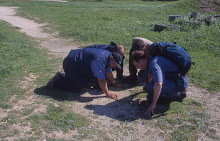lunedì 17 febbraio 2020
Jung and fascism
I love, like everybody, carl Gustav Jung. He is the prototype of the wise man, and the reading of his numerous text is always refreshing. Nonetheless he also suffers from the limitations of the "spiritual" approach. He says for instance that the rise of the totalitarisms in the XXth century is a problem of the soul. Fascism (when Jung writes of totalitarism means also the SOviet Unon but his analysis is more suited to fascism) is obviously a problem of the soul, it literally the incapability to love, but the cure to this illness cannot be neither psychonalaysis nor phylosophy bor religion, the only cure is politics. Man must find the solution to his problems in himself, but this self is fundamentally a social construction. Archetypes are only stones in the building of personality, the design of this construction is largelly social.
mercoledì 12 febbraio 2020
Romanticism, nature
In particular after the criticism of Martin heidegger, we tend to believe that illuminism and scientism are the phylosophy of bourgeoisie. But, in fact the phylosophy of bourgeoise is romanticism. Illuminims precedes the French revolution, whereas romanticism arises after. The two are more closely related than usually believed (the illuminis Rousseau has many point of conncetion to romanticism) but the importance of sentiment, of self-expression of individualism, even the importance of beauty are all hallmark of the bourgeois way of thinling. True rationalism has always been the phylosophy of illuminated élites often with marxist background.
This is particularly important in conncetion with the environemntal proble, Much of the approach of enviornmentalist is based on a romantic idea of Nature, This approach is often detrimental ore even harmufl, since the romantic vision of nature, emphasizing the role of "pristine" nature where the blow of the spirit of nature is overwhelming and failing to recognize that ecosystems are not something mystic but a compelx network of relationships regulate by very complex mathematical laws, is unsuited to manage and preserve the ecosystems in an epoch of global impact of humanity on the biosphere, We can set apart a few spots of "untouched" nature, but this is relatively irrelevant to the management of the entire biosphere, which should be the aim of the neviornemntal movement. Lucklily the approach of Greta Thunberg seems closer to that of an ecologist than to that of the old school of environmentalists.
This is particularly important in conncetion with the environemntal proble, Much of the approach of enviornmentalist is based on a romantic idea of Nature, This approach is often detrimental ore even harmufl, since the romantic vision of nature, emphasizing the role of "pristine" nature where the blow of the spirit of nature is overwhelming and failing to recognize that ecosystems are not something mystic but a compelx network of relationships regulate by very complex mathematical laws, is unsuited to manage and preserve the ecosystems in an epoch of global impact of humanity on the biosphere, We can set apart a few spots of "untouched" nature, but this is relatively irrelevant to the management of the entire biosphere, which should be the aim of the neviornemntal movement. Lucklily the approach of Greta Thunberg seems closer to that of an ecologist than to that of the old school of environmentalists.
Etichette:
romanticism. Greta Thunberg,
XIX secolo
Iscriviti a:
Commenti (Atom)
